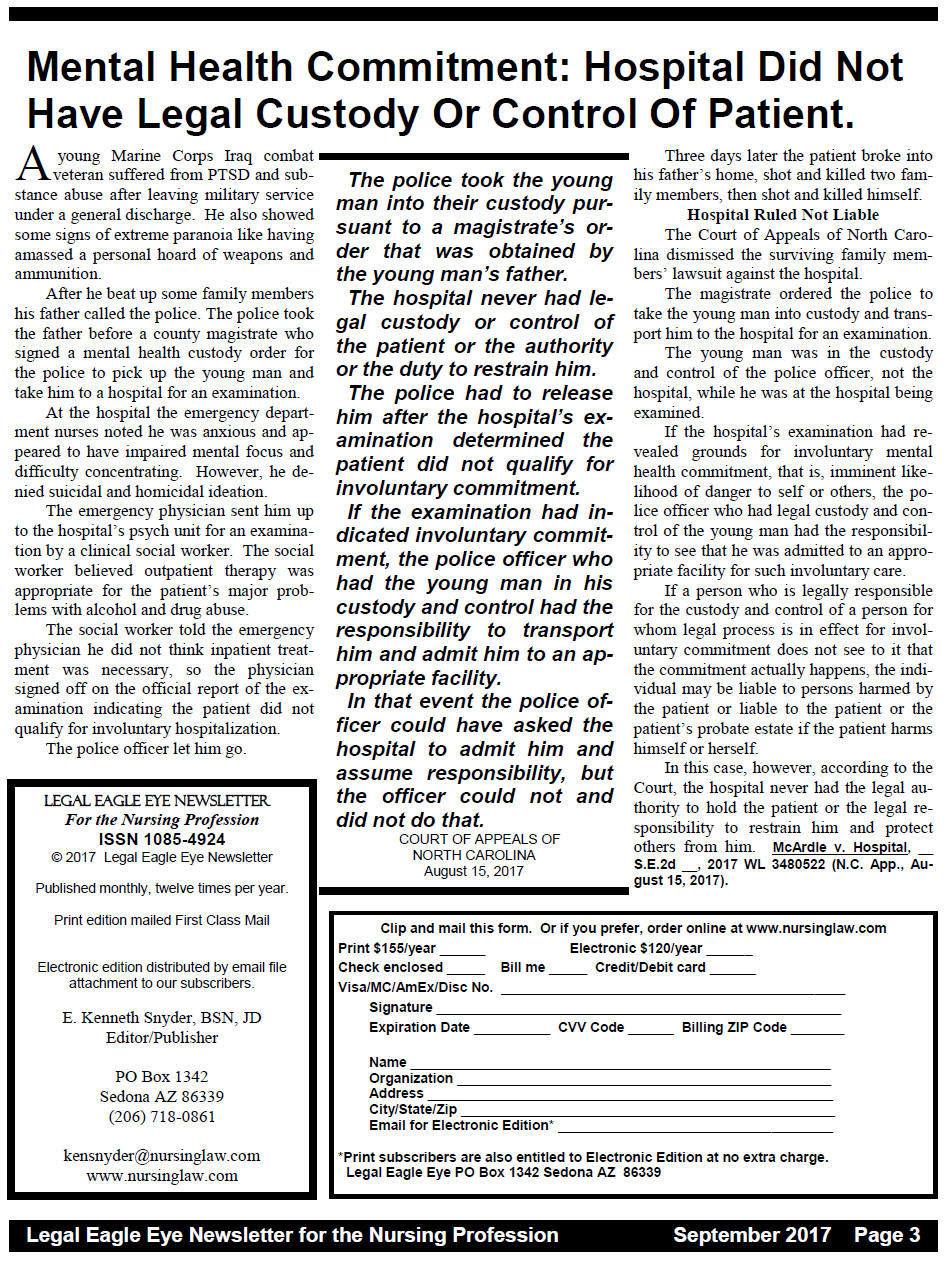
Legal Eagle Eye Newsletter for the Nursing Profession Home Page
New Subscriptions I About Our Newsletter I Sample Newsletter I FAQ I Contact Us

Mental Health Commitment: Hospital Did Not Have Legal Custody Or Control Of Patient.
The police took the young man into their custody pursuant to a magistrate's order that was obtained by the young man's father.
The hospital never had legal custody or control of the patient or the authority or the duty to restrain him. The police had to release him after the hospital's examination determined the patient did not qualify for involuntary commitment.
If the examination had indicated involuntary commitment, the police officer who had the young man in his custody and control had the responsibility to transport him and admit him to an appropriate facility. In that event the police officer could have asked the hospital to admit him and assume responsibility, but the officer could not and did not do that.
COURT OF APPEALS OF NORTH CAROLINA August 15, 2017A young Marine Corps Iraq combat veteran suffered from PTSD and substance abuse after leaving military service under a general discharge. He also showed some signs of extreme paranoia like having amassed a personal hoard of weapons and ammunition. After he beat up some family members his father called the police. The police took the father before a county magistrate who signed a mental health custody order for the police to pick up the young man and take him to a hospital for an examination.
At the hospital the emergency department nurses noted he was anxious and appeared to have impaired mental focus and difficulty concentrating. However, he denied suicidal and homicidal ideation. The emergency physician sent him up to the hospital's psych unit for an examination by a clinical social worker. The social worker believed outpatient therapy was appropriate for the patient's major problems with alcohol and drug abuse. The social worker told the emergency physician he did not think inpatient treatment was necessary, so the physician signed off on the official report of the examination indicating the patient did not qualify for involuntary hospitalization.
The police officer let him go. Three days later the patient broke into his father's home, shot and killed two family members, then shot and killed himself.
The Court of Appeals of North Carolina dismissed the surviving family members' lawsuit against the hospital. The magistrate ordered the police to take the young man into custody and transport him to the hospital for an examination.
The young man was in the custody and control of the police officer, not the hospital, while he was at the hospital being examined. If the hospital's examination had revealed grounds for involuntary mental health commitment, that is, imminent likelihood of danger to self or others, the police officer who had legal custody and control of the young man had the responsibility to see that he was admitted to an appropriate facility for such involuntary care. If a person who is legally responsible for the custody and control of a person for whom legal process is in effect for involuntary commitment does not see to it that the commitment actually happens, the individual may be liable to persons harmed by the patient or liable to the patient or the patient's probate estate if the patient harms himself or herself.
In this case, however, according to the Court, the hospital never had the legal authority to hold the patient or the legal responsibility to restrain him and protect others from him.
McArdle v. Hospital, __ S.E.2d __, 2017 WL 3480522 (N.C. App., August 15, 2017).Additional references from nursinglaw.com
http://www.nursinglaw.com/abuse-patient.htm
http://www.nursinglaw.com/alcohol-withdrawal-disability-discrimination.htm
http://www.nursinglaw.com/suicidal-mental-health-commitment.htm
http://www.nursinglaw.com/search-patient-property.htm
http://www.nursinglaw.com/arrest-warrant-patient.htm
http://www.nursinglaw.com/psychiatric-hold-nurse-negligence.htm
http://www.nursinglaw.com/excessive-force-police-nurse.htm
http://www.nursinglaw.com/hostage-drill-nursing-home.htm
http://www.nursinglaw.com/hospital-family-belligerent.htm
http://www.nursinglaw.com/forced-catheterization.htm
http://www.nursinglaw.com/emergency-department-nurse.htm